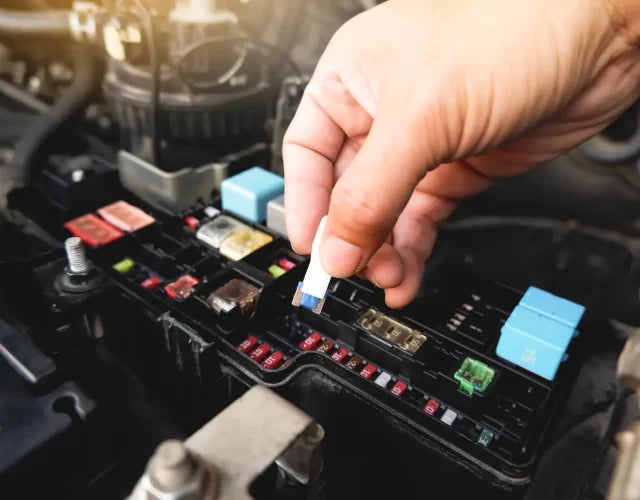Your car’s electrical system is an intricate network of components working together to power everything from your headlights to your air conditioning. At the heart of this system are automotive fuses and relays, two critical components that ensure electrical safety and efficiency. But what exactly do they do, and why are they so important? Let’s explore their roles and how they keep your vehicle running smoothly.
Understanding Car Fuses – Your First Line of Defence
A fuse is a small but essential device designed to protect your car’s electrical circuits from damage. If an electrical component draws too much current – due to a fault, short circuit, or overload – the fuse in your car fuse box will blow, cutting off power before serious damage occurs. Fuses prevent wiring damage, electrical fires, and costly repairs by stopping excessive current from flowing – they come in different sizes and ratings, ensuring that each circuit gets the right level of protection. Without properly functioning vehicle fuses and relays, a minor electrical issue could escalate into a major problem.
Common signs of a blown fuse include:
- A non-working accessory (such as power windows or interior lights)
- Electrical components suddenly shutting off
- A burnt smell near the car fuse box
If you notice these signs, checking the fuse box should be your first step before assuming a component has failed.
Car Relays – The Power Switches of Your Vehicle
While fuses protect circuits, car relays act as switches that control high-power electrical components with a low-power signal. In simple terms, a relay allows a small electrical current to control a much larger one. For example, when you turn on your headlights, a small switch inside the dashboard sends a low-power signal to the car relay function, which then activates the high-power circuit to illuminate your headlights. This design prevents switches from wearing out due to high electrical loads and ensures that power is distributed efficiently throughout your car electrical system.
Relays are commonly used for:
- Headlights and fog lights
- Electric cooling fans
- Fuel pumps
- Horns
- Power windows and sunroofs
A failing relay can cause intermittent electrical issues, such as flickering headlights or a fuel pump that refuses to engage. Unlike fuses, which blow when overloaded, relays often fail due to worn-out internal contacts, corrosion, or heat damage.
Why Proper Fuse and Relay Maintenance Matters
As you can see, ignoring issues with car fuses and relays can lead to frustrating electrical failures, expensive repairs, or even safety hazards. If you experience frequent blown fuses or malfunctioning relays, it could indicate deeper wiring problems that require professional attention.
At Elevate Automotive, we specialise in diagnosing and repairing all aspects of your car electrical system. Whether you need a faulty car relay function fixed, a fuse box inspected, or a complete vehicle fuses and relays overhaul, our expert team ensures your car operates safely and efficiently. Don’t let minor electrical issues turn into major headaches – get in touch with Elevate Automotive today for professional auto-electrical solutions tailored to your needs.

